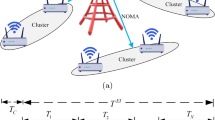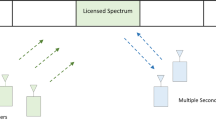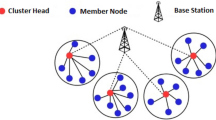Abstract
In recent days, accessing the spectrum of Cognitive Radio spread has gained significance in the applications of sensor based wireless devices. In this promising environment the bottle neck existed in accessing the spectrum which makes complications in the setup on wireless networks. In each cognitive space the spread spectrum optimization to the entire user is much more needed for enjoying the fruits of cognitive Radio. To achieve this, an effective mechanism is needed for the effective utilization of spectrum in cognitive radio system. Even though there are many substantial innovations in the area of cognitive radio none of the prevailing articles have focused on providing solutions to the problems which are related to efficient allocation of spectrum for each subordinate user with less power utilization and interference. In this article, the framework has been analyzed in both presence and absence of prime users with maximizing the capacity and data rate of the network. Further, the proposed model is solved by integrating a hybrid optimization algorithm with effective decision-making mechanism. Moreover, the simulation results validate that best solution is achieved considering capacity, spectrum sharing, data rate and interference for each subordinate users in entire network.







Similar content being viewed by others
References
Zhang H, Jiang C, Beaulieu NC et al (2014) Resource allocation in spectrum-sharing OFDMA femtocells with heterogeneous services. IEEE Trans Commun 62:2366–2377. https://doi.org/10.1109/TCOMM.2014.2328574
Zhang H, Jiang C, Hu RQ, Qian Y (2016) Self-organization in disaster-resilient heterogeneous small cell networks. IEEE Netw 30:116–121. https://doi.org/10.1109/MNET.2016.7437033
Zhang H, Chu X, Guo W, Wang S (2015) Coexistence of Wi-Fi and heterogeneous small cell networks sharing unlicensed spectrum. IEEE Commun Mag 53:158–164. https://doi.org/10.1109/MCOM.2015.7060498
Dastangoo S, Fossa CE, Gwon YL, Kung H-T (2016) Competing cognitive resilient networks. IEEE Trans Cogn Commun Netw 2:95–109. https://doi.org/10.1109/tccn.2016.2570798
‘1000x’ (2013) More spectrum-especially for small cells. http://www.qualcomm.com/1000x. Accessed Mar 2013
Federal Communications Commission (2019) Enabling spectrum sharing and small cell wireless broadband services in the 3.5 GHz band. http://www.fcc.gov. Accessed 10 Feb 2019
Chandrasekhar V, Andrews JG, Muharemovic T et al (2009) Power control in two-tier femtocell networks. IEEE Trans Wirel Commun 8:4316–4328. https://doi.org/10.1109/TWC.2009.081386
Kang X, Zhang R, Motani M (2011) Price-based resource allocation for spectrum-sharing femtocell networks: a Stackelberg game approach. In: 2011 IEEE Global Telecommunication Conference—GLOBECOM 2011, pp 1–5. https://doi.org/10.1109/GLOCOM.2011.6133874
Yun JH, Shin KG (2011) Adaptive interference management of OFDMA femtocells for co-channel deployment. IEEE J Sel Areas Commun 29:1225–1241. https://doi.org/10.1109/JSAC.2011.110610
Guruacharya S, Niyato D, Kim DI, Hossain E (2013) Hierarchical competition for downlink power allocation in OFDMA femtocell networks. IEEE Trans Wirel Commun 12:1543–1553. https://doi.org/10.1109/TWC.2013.022213.120016
Huang JW, Krishnamurthy V (2011) Cognitive base stations in LTE/3GPP femtocells: a correlated equilibrium game-theoretic approach. IEEE Trans Commun 59:3485–3493. https://doi.org/10.1109/TCOMM.2011.093011.100693
Chen Y, Zhang J, Zhang Q (2012) Utility-aware refunding framework for hybrid access femtocell network. IEEE Trans Wirel Commun 11:1688–1697. https://doi.org/10.1109/TWC.2012.031212.110002
Ha VN, Le LB (2014) Distributed base station association and power control for heterogeneous cellular networks. IEEE Trans Veh Technol 63:282–296. https://doi.org/10.1109/TVT.2013.2273503
Liu Y, Dong L (2014) Spectrum sharing in MIMO cognitive radio networks based on cooperative game theory. IEEE Trans Wirel Commun 13:4807–4820. https://doi.org/10.1109/TWC.2014.2331287
Chen J, Swindlehurst AL (2012) Applying bargaining solutions to resource allocation in multiuser MIMO-OFDMA broadcast systems. IEEE J Sel Top Signal Process 6:127–139. https://doi.org/10.1109/JSTSP.2012.2188275
Ni Q, Zarakovitis CC (2012) Nash bargaining game theoretic scheduling for joint channel and power allocation in cognitive radio systems. IEEE J Sel Areas Commun 30:70–81. https://doi.org/10.1109/JSAC.2012.120107
Prasad N, Li K, Wang X (2009) Fair-rate allocation in multiuser OFDM-SDMA networks. IEEE Trans Signal Process 57:2797–2808. https://doi.org/10.1109/TSP.2009.2016246
Kramer G, Marić I, Yates RD (2006) Cooperative communications. Found Trends Netw 1:271–425. https://doi.org/10.1561/1300000004
Ding L, Melodia T, Batalama SN, Matyjas JD (2015) Distributed resource allocation in cognitive and cooperative ad hoc networks through joint routing, relay selection and spectrum allocation. Comput Netw 83:315–331. https://doi.org/10.1016/j.comnet.2015.02.027
Zhang SL, Xu WJ, Li SY, Lin JR (2013) Resource allocation for the cluster-based cooperative multicast in OFDM-based cognitive radio systems. J China Univ Posts Telecommun 20:1–7. https://doi.org/10.1016/S1005-8885(13)60061-8
Long Y, Li H, Yue H et al (2014) Spectrum utilization maximization in energy limited cooperative cognitive radio networks. In: 2014 IEEE International Conference on Communications (ICC), vol. 32, pp 1466–1471. https://doi.org/10.1109/ICC.2014.6883528
Hua S, Liu H, Zhuo X et al (2014) Exploiting multiple antennas in cooperative cognitive radio networks. IEEE Trans Veh Technol 63:3318–3330. https://doi.org/10.1109/TVT.2013.2297438
Tang M, Xin Y (2016) Energy efficient power allocation in cognitive radio network using coevolution chaotic particle swarm optimization. Comput Netw 100:1–11. https://doi.org/10.1016/j.comnet.2016.02.010
Asheralieva A, Mahata K (2015) Resource allocation for LTE-based cognitive radio network with queue stability and interference constraints. Phys Commun 14:1–13. https://doi.org/10.1016/j.phycom.2014.11.001
Rahman MA, Lee YD, Koo I (2016) An efficient transmission mode selection based on reinforcement learning for cooperative cognitive radio networks. Human Centric Comput Inf Sci. https://doi.org/10.1186/s13673-016-0057-2
Uddin MF, Assi C, Ghrayeb A (2014) Joint optimal AF relay assignment and power allocation in wireless cooperative networks. Comput Netw 58:58–69. https://doi.org/10.1016/j.comnet.2013.08.023
Awoyemi B, Maharaj B, Alfa A (2017) Optimal resource allocation solutions for heterogeneous cognitive radio networks. Digit Commun Netw 3:129–139. https://doi.org/10.1016/j.dcan.2016.11.003
Kamel SH, Abd-el-Malek MB, El-Khamy SE (2019) Compressive spectrum sensing using chaotic matrices for cognitive radio networks. Int J Commun Syst 32:1–16. https://doi.org/10.1002/dac.3899
Yawada PS, Dong MT (2019) Intelligent process of spectrum handoff/mobility in cognitive radio networks. J Electr Comput Eng 2019:1–12. https://doi.org/10.1155/2019/7692630
Khan MS, Jibran M, Koo I et al (2019) A double adaptive approach to tackle malicious users in cognitive radio networks. Wirel Commun Mob Comput. https://doi.org/10.1155/2019/2350694
Author information
Authors and Affiliations
Corresponding author
Additional information
Publisher's Note
Springer Nature remains neutral with regard to jurisdictional claims in published maps and institutional affiliations.
Rights and permissions
About this article
Cite this article
Teekaraman, Y., Manoharan, H., Basha, A.R. et al. Hybrid Optimization Algorithms for Resource Allocation in Heterogeneous Cognitive Radio Networks. Neural Process Lett 55, 3813–3826 (2023). https://doi.org/10.1007/s11063-020-10255-2
Published:
Issue Date:
DOI: https://doi.org/10.1007/s11063-020-10255-2




